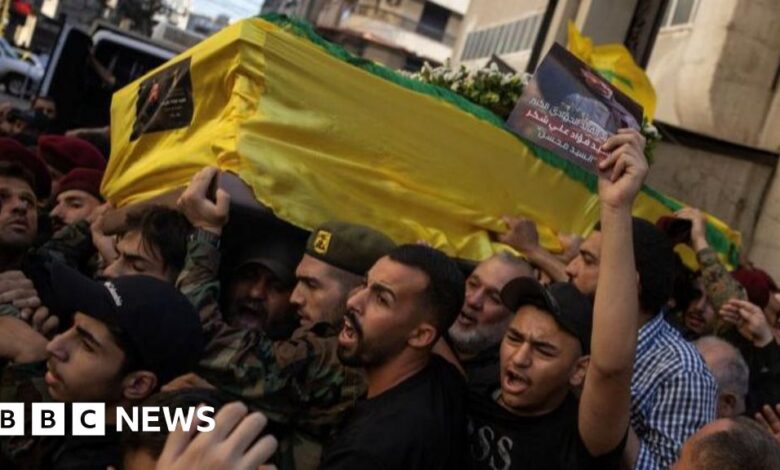Hezbollah leader says conflict with Israel is in ‘new phase’ after killing

In Beirut’s southern suburb of Dahiya, a Hezbollah stronghold, large crowds dressed in black attended the funeral of Fuad Shukr, a senior commander of Lebanon’s powerful militia and political movement and the highest-ranking member assassinated by Israel in the current fighting.
They carried posters with Shukr’s image, waved Hezbollah’s yellow and green flag and chanted some of the group’s slogans, sometimes raising their fists.
According to the Israeli military, Shukr was behind a rocket attack that killed 12 children and teenagers on a soccer field in the Israeli-occupied Golan Heights last Saturday. Hezbollah has denied involvement, although it initially claimed to have attacked a nearby military base, raising the possibility that the rocket missed its intended target.
Shukr, also known as al-Hajj Mohsin, is said to be a close adviser to Hassan Nasrallah, the longtime and influential leader of Hezbollah.
As people gathered, Nasrallah gave a televised speech that was closely watched for any signs of Hezbollah’s next moves.
The conflict with Israel has entered a “new phase,” he said, speaking from a secret location, as he often did for security reasons. The enemy must expect an “inevitable response” because it has crossed a “red line,” he added, saying the response would be proportionate to Israel targeting a civilian building.
His tone seemed to suggest the group was still not interested in another major war with Israel. But there are concerns that they could be sliding into one.
“I am not afraid of war. We are ready for whatever Sheikh Nasrallah decides to do,” one man in the crowd told me. “Inshallah,” another said, meaning God willing, when asked if he believed Hezbollah would retaliate for the killing.
Shukr’s killing on Tuesday — an attack that also killed six others, including two siblings — raised fears that the relatively contained conflict between Hezbollah and Israel could escalate into a full-blown war, potentially engulfing the entire Middle East.
Hezbollah said its campaign, which began a day after Hamas attacks on Israel on October 7, was in support of Palestinians in Gaza. Most of the group’s attacks and Israeli counterattacks have been limited to areas along the Lebanon-Israel border.
Supported by Iran, Hezbollah has long been viewed by Israel as a much more formidable foe than Hamas, with an increasingly sophisticated arsenal that includes attack drones and precision-guided missiles capable of striking deep inside Israel.
A conflict with Hezbollah would likely involve other Iranian-backed groups in the region, members of what Tehran calls the “Axis of Resistance” — for example the Houthis in Yemen or militias in Iraq.
Iran has also vowed to retaliate. Assassination of Ismail HaniyehHamas’ political leader was killed on Wednesday while visiting Tehran to attend the inauguration of Iran’s new president.
Iran and Hamas blamed Israel, but Israel remained silent. The killing dealt a blow to the prospects of any ongoing talks on a ceasefire and hostage release between Israel and Hamas in Gaza, the main hope for easing tensions with Hezbollah, and diplomatic efforts continue to try to defuse the situation.
The Israeli military said it was ready for any eventuality as the country braced for a possible response to the two assassinations.
Nasrallah’s speech contained the expected harsh rhetoric against Israel but did not appear to imply that a larger war was imminent.




